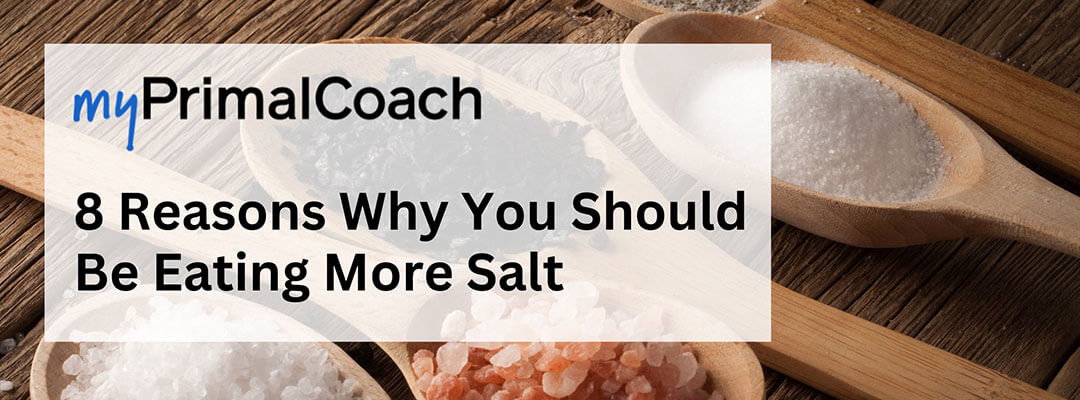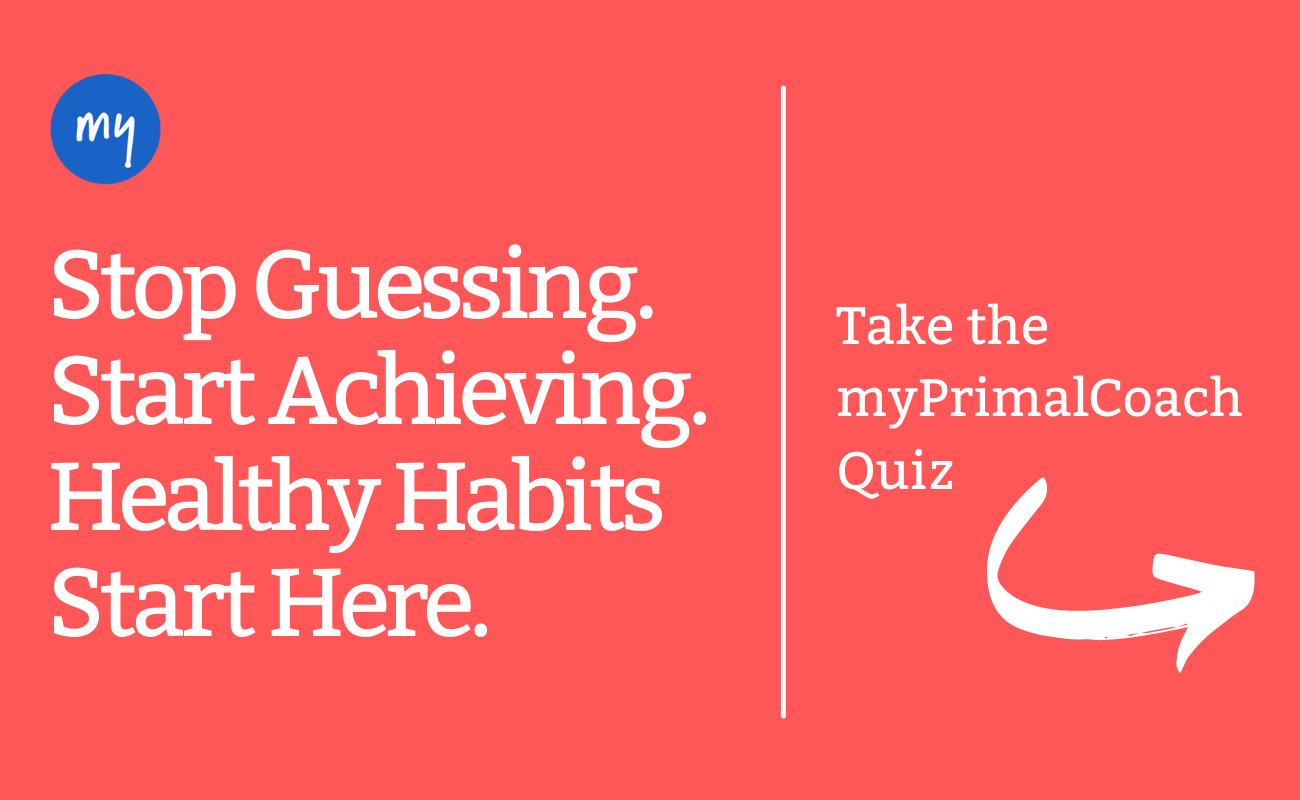Contrary to what we’ve been told for years, there are important reasons why you should be eating more salt—especially if you follow a primal lifestyle. While we are well aware of the dangers of an excess sodium intake, many are not aware of the downside of consuming too little sodium. A high salt diet has been linked to high blood pressure, amongst other complications, but a low salt diet comes with its own list of complications and undesirable side effects.

Before we dive into why you should be eating more salt and just how to do that in a healthy manner, let’s first examine what salt is and the different types.
What Is Salt?
Salt is a chemical compound made up of 40 percent sodium and 60 percent chloride and is referred to as sodium chloride for this reason. Much like fat, sodium is an essential nutrient that has been vilified for far too long. Essential simply means your body cannot make it, and you must get adequate amounts from the food you eat. What is the main source of sodium for us? Salt.
Daily sodium intake is necessary for many of our important bodily functions, including:
- Nerve and muscle function
- Fluid and mineral balance
- Blood pressure regulation
In the culinary world, salt has been used as a preservative for eons and is used today in packaged foods. A standard American diet high in fast food, processed foods, and most shelf-stable eats such as canned foods are usually to blame for a high daily sodium intake and subsequent health issues. If you are living a primal lifestyle and consuming natural foods, however, your salt intake may not be high enough on a daily basis.
Healthy people with normal blood pressure and no chronic kidney disease do not yield any health benefits from sodium restriction. When a healthy person consumes excess salt, their kidneys will excrete sodium to keep the sodium blood levels levels normal. If they consume too little salt, the body will retain more sodium to raise low sodium levels and keep blood pressure balanced.
The Type of Salt Matters
All types of salt come from the sea, but there are some key differences amongst the different varieties:
Table Salt
Normal table salt, the kind you find in standard salt shakers, is highly processed and stripped of minerals. Often, chemicals are added to keep it from caking in humidity, and it can even be bleached to retain its whiteness. Sometimes, there is even added dextrose, a form of sugar. Table salt is also iodized, meaning it has added iodine. This is important because we do need iodine, but it’s probably not the best source.
Sea Salt
Sea salt, such as Celtic sea salt, is thought to be the healthiest salt option, because it is unrefined and unprocessed, and contains trace minerals, including potassium. In rats, sea salt has been linked to less hypertension, and less heart and kidney damage than refined salt. Interestingly, sea salt is not always white, thanks to no bleaching for aesthetics, and can be a range of colors such as pink Himalayan salt, grey, and even black.
Kosher Salt
Kosher salt is pure sodium chloride. It doesn’t contain any trace minerals (like sea salt), or iodine (like table salt), but also does not contain any additives. It’s preferred by chefs for cooking because its larger grain size makes it easier to control and sprinkle.
8 Reasons Why You Should Be Eating More Salt
- Blood Pressure Levels
Low blood pressure, known as hypotension, can occur if you do not include enough sodium in your diet. Bothersome symptoms that can also be dangerous include dizziness, fatigue, fainting, depression, heart palpitations, and blurred vision. - Hydration
Sodium is an electrolyte that helps keep your body’s fluid levels balanced. Your cells, muscles, and tissues require a proper amount of water to function. Too little salt consumption can lead to dehydration. - Thyroid
In order to function properly, your thyroid gland needs iodine. Without the mineral, it won’t be able to make enough thyroid hormone. An iodine deficiency can lead to thyroid disease, especially hypothyroidism, and cause unwanted symptoms such as fatigue, weight gain, and intolerance to cold temperatures. Iodized table salt is highly processed but is the best salt source. Natural sea salt also contains small amounts of iodine, and wild seafood is another a healthy source of iodine. - Hormones
Salt helps remove the stress hormone cortisol from the body, which allows you to recover from stress much faster than if it lingers in the bloodstream. - Insulin Sensitivity
Low salt intake is associated with increased insulin resistance, a precursor to type 2 diabetes. For people already diagnosed with type 2 diabetes, salt restriction can advance insulin resistance. - Heart Health
Did you know that a low salt diet is linked to an increased risk of heart attack and stroke? Consuming too little salt has been linked to elevated LDL cholesterol, and triglyceride levels, both of which are known to lead to cardiovascular disease. In fact, a low salt diet is just as dangerous to your health health as a diet with higher salt consumption. Research suggests that a moderate salt intake is linked to the lowest risk of cardiovascular events or heart failure. - Healthy Nervous System
According to the Harvard School of Public Health, 500 milligrams of sodium is necessary on a daily basis for contracting and relaxing muscles and conducting nerve impulses. If you are following a primal way of eating and cooking all of your own food, it’s important to season well and add salt to your dishes in order to meet this daily requirement just for your nervous system to function properly. - Digestion
Salt itself does not need to be digested by the body, but both sodium and chloride ions (the main chemical components of salt) help the body absorb nutrients from the foods we eat. Sodium is critical to help move the nutrients from the cells of the intestines into our bloodstream.
How to Increase Your Salt Intake
Other than a generous sprinkling while preparing your home-cooked primal meals, natural sources of primal foods with a sodium content include:
- Seafood, such as shrimp and oysters
- Certain vegetables, including celery, beets, bell peppers, broccoli, and carrots
- Sea vegetables
- Pickles
- Olives
- Salted nuts and seeds roasted without refined vegetable oils
- Salted nut butter
- Fermented foods such as kimchi and sauerkraut
- Canned seafood such as tuna, salmon, anchovies, and sardines
- Additive-free smoked and cured meats such as bacon, sausages, hot dogs, jerky, and prosciutto
- Coconut aminos
Summary
It’s pretty clear why you should be eating more salt if you follow a primal lifestyle. Your sodium intake needs are bio-individual and depend on your salt sensitivity, so it is always important to get personal medical advice from a medical professional. However, it’s important not to fear salt if you are following a primal lifestyle. The real danger lies in consuming processed and packaged foods and not whole, real foods.
Whether you need assistance adopting a new eating pattern and reaching a healthy weight, help with navigating food labels, or just general nutrition and healthy lifestyle guidance, a myPrimalCoach is here to help get you started.

